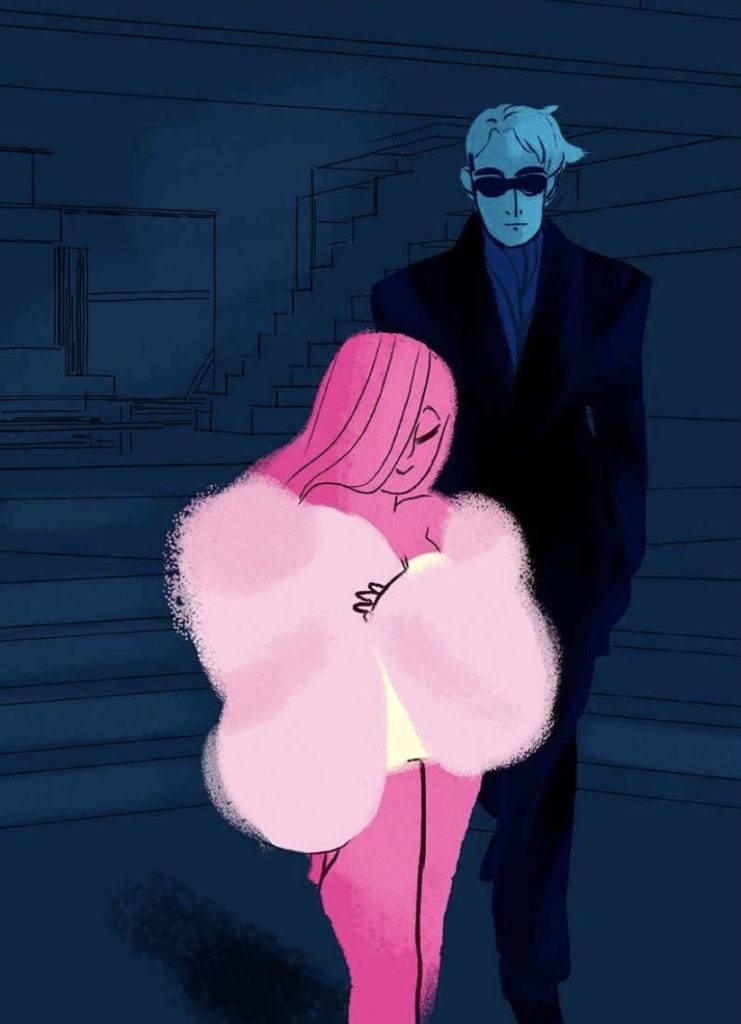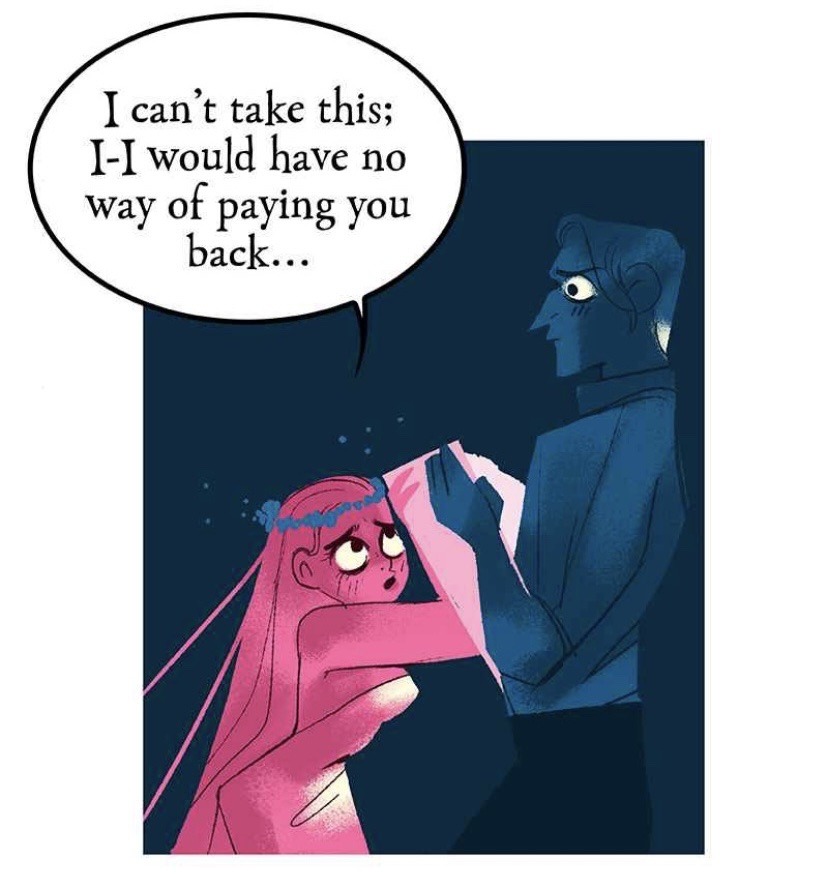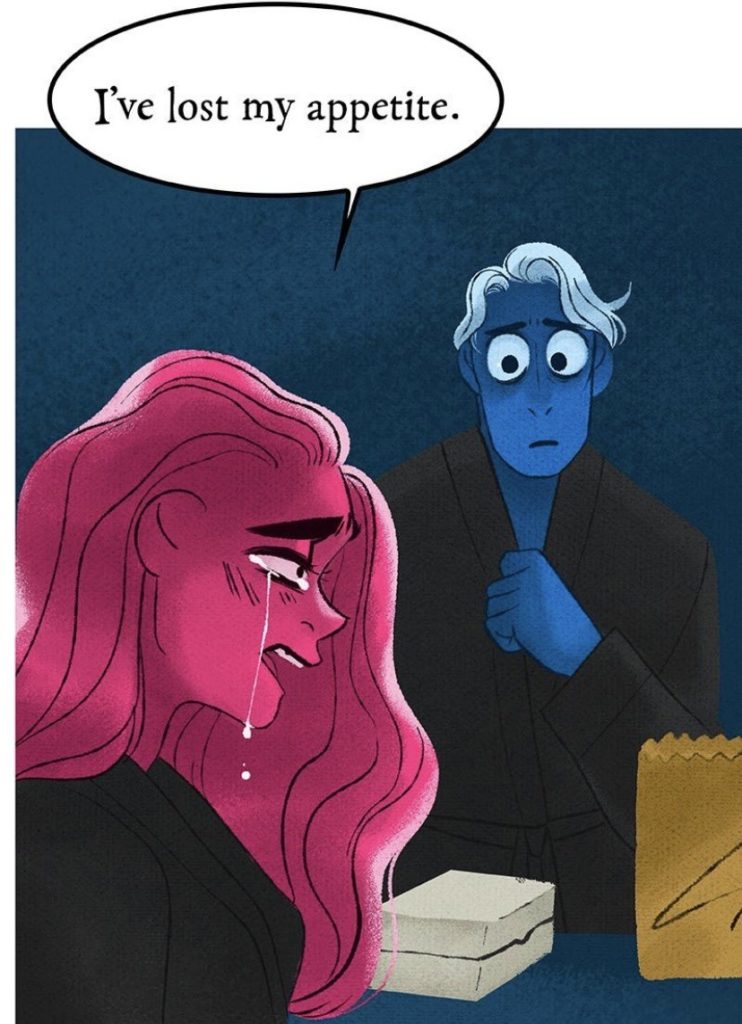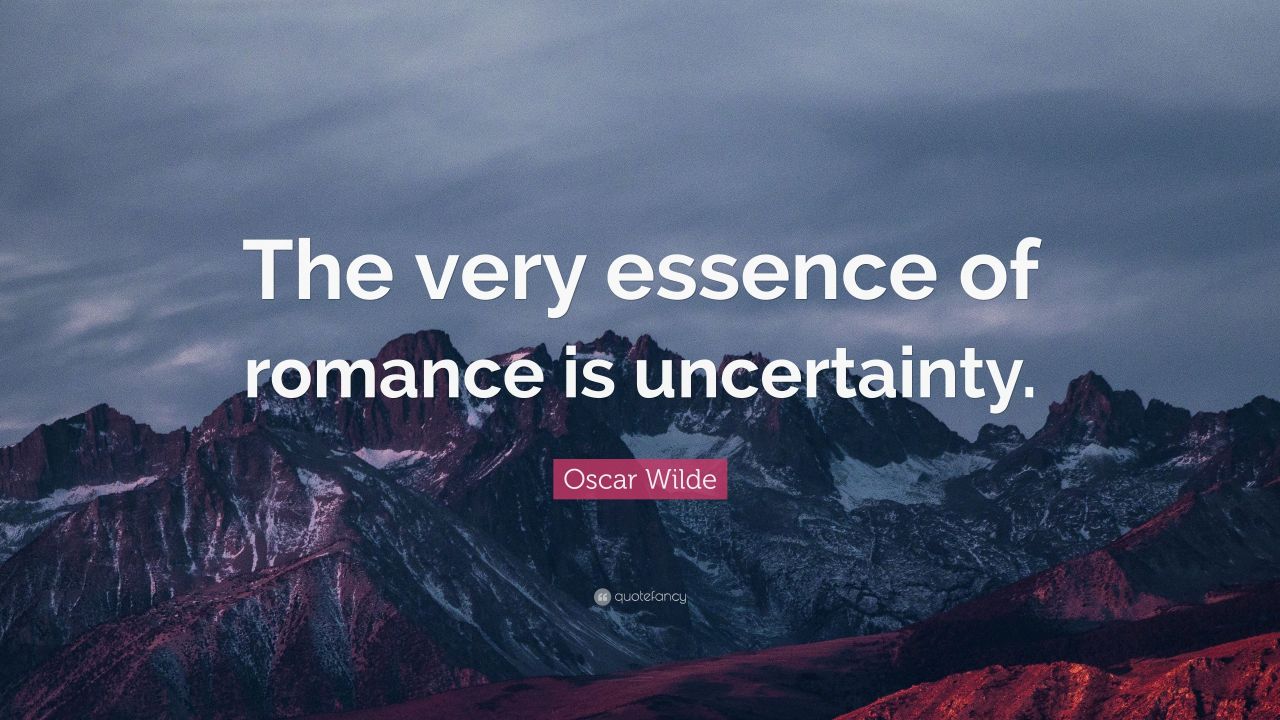I’ve been seeing this floating around Tumblr recently: “The very essence of romance is uncertainty.”
On the surface, it’s true. There is always uncertainty at the beginning of a relationship, discovering if someone feels the same way about you, opening up to each other. But as a relationship grows, that feeling of uncertainty needs to give way.
Romance in media is all about the uncertainty, coming up with artificial situations to keep people apart and build tension. In her 200+ episode run of Lore Olympus, Rachel Smythe has used every single trope that exists in the genre.
I’m so tired of seeing these dramatic situations as the foundation of a romance, especially ones marketed to teens and young adults. Manufacturing instability is a tactic often used by abusers. When we normalize poor communication and emotional manipulation, it creates opportunities for bad people to excuse their own hurtful behaviors.
This piece is a critique of the Romance genre as a whole. I’m using Lore Olympus as the example because it goes 110% into every single trope. I will be addressing the sexualization of power imbalances, poor communication, and her portrayal of sexual assault and intimate partner abuse.
There will be spoilers for all published Lore Olympus episodes. If you don’t want to read a critique on the series, go find something else to do.
Content/Trigger warning: some discussion of sexual assault and abusive relationship dynamics.
Final disclaimer– this isn’t a hate piece on Lore Olympus, and this isn’t a hate piece on Rachel Smythe. I’m one of the many people who was gobbling the series up, but then I hit a place where the bad qualities overwhelmed what I used to love about it. Consider this a break-up essay.
Power Imbalance
Let’s just jump right in, shall we? Lore Olympus is 50 Shades of Gray set in the Greek Pantheon, with a nineteen-year-old romantic lead.

We start with an Opposites Attract trope. Persephone/Kore is a wide-eyed ingenue fated to fall in love with Hades, Lord of the Underworld. Their color scheme is fantastic! And for some reason, Rachel decided to double down on the age difference – she has gone out of her way to explain that Persephone is only 19, regular, human years old, while Hades has been around since the dawn of man.
This webtoon started in 2018, one year after the #MeToo movement.
Cool. Cool-cool-cool.
I don’t have a problem with sexualizing power imbalances. I mean, that’s where 90% of kink comes from. I have zero problems with those dynamics when they’re done well – for example, see Hannibal- Killing Eve- even You to some extent (notice how these are all villain stories…). But it becomes an issue when that disparity is woven into the relationship, and the author clearly hasn’t thought through all the implications.
In Lore Olympus, Rachel keeps increasing the power disparity between Persephone and Hades. Along with having someone who is thousands of years old lusting after a literal teenager, there is also a massive wealth gap.
Committing to the 50 Shades parallels, Hades is CEO of the Underworld, working long hours, wearing handmade suits, living the perfect capitalist fantasy. In the opening arc of the series, Hades gifts Persephone a gorgeous fur coat and drives her home in his fancy sports car. Persephone, a broke college freshman, tells Hades that she’ll ‘pay him back’ for the coat. (Look! She’s not a gold-digger!)

There isn’t even a good reason for Persephone to not have money. She’s the heiress to a food company fortune through her mother, the goddess Demeter. Keeping her poor is just a plot device that further ties her to Hades.
Oh yeah, can’t forget to mention that Hades becomes Persephone’s boss… so I guess we can also add a Workplace Romance into the trope blender… We’re not even done yet.
Rachel also makes a very big deal about Persephone’s virginity/lack of sexual experience. Doubling down again, Persephone’s primary personality traits are child-like. She has wide eyes, is emotionally expressive, and naive. That’s fine for a 19 year old dating within her peer group, and really creepy when that person is approached by an adult.
So in the initial romantic set up there is a massive age gap, wealth gap, and romantic/sexual experience gap… in a comic that is marketed primarily towards teens and younger adults. This isn’t okay. We shouldn’t be pushing these kinds of disparities as examples of aspirational romance.
It’s especially obnoxious because Rachel didn’t have to make Persephone so young. She could be some kind of ambiguous god-age, similar to all the late 20s- early 30s actors/actresses playing high schoolers (also kinda creepy, but at least it’s more appropriate). She didn’t have to make Persephone broke – she could have gone full Legally Blonde, setting her up as a rich kid in her first year of university.
With all the disparities between these two, how does Rachel decide to level the playing field? She makes Hades emotionally immature *cue sad trombone music * ‘Everything is okay, because this adult man has a difficult time setting boundaries and communicating in a relationship! He desperately needs the right woman to come in and save him!’
I hate this trope so much. It isn’t sexy when adult men can’t handle their emotions and relationships. Someone decades younger than him is not equipped to fix his issues. He needs to be seeing a therapist, not a teenager.
‘I’m just so misunderstood. You’re the only one that gets me’ is a manipulation tactic. It may sound deep to someone without a lot of life/dating experience, but it wears thin soon after. We’ve all had this boyfriend/partner, and have had to learn the hard way that it’s a sign of trouble – this basically summarizes Olivia Rodrigo’s discography (she is also a teenager, further proving my point).
This brings me to my next topic, the trope of Miscommunication in the Romance genre.
Miscommunication
Like, I get why this is a trope. Miscommunication stretches out the story. You can have a subplot with each couple, and turn one season worth of drama into three. But miscommunication is a relationship killer. The ability to communicate intentions and needs is a requirement of a healthy relationship.
I have always hated the drag-out not-telling-your-crush-you-like-them thing. It’s especially tired here, when one half of the potential couple is a grown ass man.
Hades doesn’t admit his feelings for Persephone because of the age difference, that he’s her boss, that she is a member of a virgin collective. He quietly yearns for her and rakes himself over hot coals. But then he plunges ahead anyway, pursuing her romantically. It’s as if Rachel is telling us, ‘He gave himself a hard time for all that stuff, so it’s okay when he does it.’
We’re still just skimming the surface. The biggest let-down in communication comes from the storyline surrounding Persephone’s sexual assault by Apollo.
Huge sidebar for this section: I understand that many people appreciate this representation of sexual assault, and have found it very empowering and healing. I am not critiquing any person who has found comfort through this storyline.
Rachel seems like someone who just wanted to write a Shonda Rhimes style romance and was not equipped to write a rape subplot in the post-#MeToo era. I believe Rachel cares. I believe she’s doing her best, but it needs to be better.
Persephone’s sexual assault happens in episode 24 and is an undercurrent in her interactions with Hades for almost 170 more episodes after that. Rachel is being realistic, having Persephone not wanting to disclose the experience, but she creates some blundering scenes with Hades in the meantime.
The final straw for me happened when Persephone disclosed her rape to Hera. At this point, Persephone is living with Hades and he doesn’t know. Persephone emerges distraught and on the point of a breakdown. Hades, to fix things, orders too much take-out, and then they go play golf with diamonds(?). Golf… with diamonds… I can’t facepalm any harder

Hades’s obliviousness isn’t cute. Rachel is doing everything she can to mold him into some heroic white-knight super-boyfriend, but they haven’t even told each other how they feel.
Oh yeah, how can I forget! At this point Hades is also serving as Persephone’s lawyer after a smear campaign (set into motion by her rapist) gets out of hand.
Compounding all of this is the fact that at the very beginning of the story, we see that Hades is in an abusive relationship with a nymph, Minthe. She is a cardboard-cut-out villain, just a foil for Persephone. Persephone is naive, while Minthe is aware of her sexuality. Persephone tells Hades she’ll pay him back, while Minthe uses Hades for his money and status while he just suffers through it.
We hardly ever see men experiencing intimate partner abuse, and Rachel doesn’t even pretend to have a realistic portrayal. She doesn’t get into the complications of a man being abused by a female partner- the invisibility, isolation, and stigma it can bring. Minthe is just a crazy bitch, and Persephone is a ‘nice girl’ who will lift Hades out of his slump.
How romantic.
Let’s zoom out again, and revisit the layers of power dynamics in this relationship: Hades is thousands of years older, is her boss and her lawyer. Persephone is coping with a rape, and is living with Hades while estranged from most of her friends and family. She has absolutely no life of her own. Why did Rachel write it that way?
This is why I don’t think Rachel is equipped to navigate a sexual assault plotline. Rape is about power and control. Persephone is being put in a place where Hades has become her whole world. This is right out of an abuser’s playbook. The isolation, dependence, and lack of communication are all features of very unhealthy relationships. And yet, Hades is being painted as a hero. We’re supposed to be rooting for this to succeed.
Final Thoughts
I care so much about this issue, because the ‘romantic’ tropes are often literal abuse tactics. We shouldn’t be marketing these stories to teens and young adults who don’t have a lot of dating and relationship experience to balance out what they see in fiction. When TV, movies, books, and comics are all emphasizing uncertainty as a sign of love it can cause people to doubt their instincts. This makes them vulnerable to being gaslit by a partner: ‘I’m only doing this because I love you so much.’
It’s gotten so bad that Penn Badgley from ‘You’ receives tweets from young women professing their love for his character, Joe Goldberg (a sad public masturbater and serial killer). The whole point of the show is that Joe is delusional, telling himself he’s in love as he stalks, manipulates, and murders women. But we’ve seen so much “Romance” that is similar to this, so it’s easy to be mistaken.
Let’s try romanticizing actual romance. When a partner does something thoughtful, that’s romantic. When people learn how to disagree with respect, patience, and understanding, that’s romantic.
So let’s round this out with some examples of stories that got it right (we can still have nice things).
Welcome to Nightvale has some of the most beautiful romances I’ve ever seen. Cecil and Carlos are an amazing couple with opposite personalities. They’ve survived the doldrums of a long-distance relationship and learned to appreciate their different perspectives. There’s also Steve Carslberg, married to Cecil’s sister and step-father to Janice. These couples are vulnerable. They are always there to support one another.
Paradise Kiss is one of my favorite manga/animes. Yukari falls for the brooding bad-boy fashion designer, who at once inspires her and plays games with her heart. At the end of the series, she is swiftly growing her modeling career and he is off to a prestigious fashion school overseas. They have both made each other better and part ways with mutual respect, each chasing their own dreams. Honestly, what’s more romantic than that?
The Witcher series has been another win. Geralt and Yennefer have chemistry. Geralt, famously a man of few words, opens up about his emotions and needs in a relationship. While they don’t always see eye to eye, they are both striving to be better people. I am very genuinely rooting for them to succeed.
In my own writing, I always prefer the development of a romantic relationship over the initial “chase”. I’m a fan of clear and obvious attraction that develops through reliability and trust. Characters often need to work through their flaws in a relationship, but they make those choices to be better and persevere through difficulty. When I write characters who are volatile or have bad power dynamics, they never wind up having a true relationship and they aren’t portrayed as aspirational.
In closing, I don’t think that Rachel Smythe is a bad person or has any malicious intent with her storytelling. It’s just obvious that she’s working within a broken genre. My biggest concern is that this comic has become too big to fail. She’s single-handedly supporting the WebToon app. Her series has been traditionally published (as well as optioned for a Netflix show). She’s going to continue making episodes without the chance for reflection or improvement.
Readers and writers, please be conscious of the media you create and consume. Let’s work to create stories about functional love and not make people cheer for the creepy stuff.
